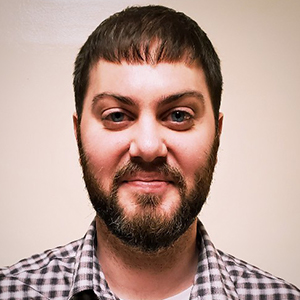
Engelking seeks to balance research and medicine
When he was young, Luke Engelking’s mother asked him what he wanted to be when he grew up. His answer? “’A mad scientist,’” he said.
Engelking certainly was exposed to the idea of a career in science and medicine early, as his mother pursued a second career as a physician’s assistant during his high school years. “Unfortunately, she had a number of rare autoimmune diseases and was often in and out of doctors’ offices,” Engelking said. “From then on, I always knew I wanted to go to med school. However, I wasn’t always certain that I wanted a Ph.D.”

Engelking ended up doing both. He went to medical school at the University of Texas Southwestern Medical Center, where he got his M.D.–Ph.D. in the lab of Nobel laureates Michael Brown and Joe Goldstein, best known for their discovery of the low-density lipoprotein receptor and its regulation of cholesterol metabolism. He enjoyed working with Brown and Goldstein.
“It was a very productive time,” Engelking said. “I really didn’t appreciate working under their aegis when I was doing it. … Once you’re out on your own, everything is more of a struggle.”
Engelking has embraced that struggle. After a residency at Massachusetts General Hospital and a clinical and research fellowship back at UT Southwestern, he not only began seeing patients as an attending physician but also opened his own research lab as an assistant professor in the departments of internal medicine and molecular genetics, studying the role of sterol receptor element-binding proteins in colon cancer growth and progression.
Now an associate professor, Engelking balances his time between seeing patients and conducting research. In addition, he is working to establish a clinical research program in colon cancer genetics so data on mutations of enrolled patients can be made publicly available to researchers at UT Southwestern and around the world.
“It’s my hope that we’ll be able to synergize the clinical work with the work going on in the lab,” he said. “It’s a challenge to try to get all of this work to align — I hope I’m making progress, but we’re not quite there yet.”
Identifying markers of cancer cell proliferation in the intestine
As a physician, Luke Engelking practices adult gastroenterology, focusing on patients with inherited mutations that lead to colorectal cancers as in Lynch and familial adenomatous polyposis, or FAP, syndromes.
In the Engelking lab, research focuses on the roles of lipids in intestinal epithelial cell growth. The lab uses Cre-lox and CRISPR tools to alter gene expression, RNA-seq and lipidomics to profile cell markers, and intestinal organoids from both humans and mice as model systems.
The researchers hope that discovering novel mechanisms by which sterol receptor element-binding proteins, or SREBPs, regulate tumor cell growth and proliferation will present new drug targets for the treatment of colon cancer. Recently, the lab demonstrated that selective loss of SREBP-2, which blocks cholesterol synthesis, leads to overgrowth and increased proliferation of intestinal progenitor cells.
“What I really hope to do is move toward patient-oriented studies,” Engelking said. “Perhaps we’ll find patients with FAP phenotypes but unknown genetic markers. There are any number of genetic unknowns that impact underlying cancer biology.”
Enjoy reading ASBMB Today?
Become a member to receive the print edition four times a year and the digital edition monthly.
Learn moreGet the latest from ASBMB Today
Enter your email address, and we’ll send you a weekly email with recent articles, interviews and more.
Latest in People
People highlights or most popular articles

2026 ASBMB election results
Meet the new Council members and Nominating Committee member.

Simcox wins SACNAS mentorship award
She was recognized for her sustained excellence in mentorship and was honored at SACNAS’ 2025 National Conference.

From humble beginnings to unlocking lysosomal secrets
Monther Abu–Remaileh will receive the ASBMB’s 2026 Walter A. Shaw Young Investigator Award in Lipid Research at the ASBMB Annual Meeting, March 7-10 in Washington, D.C.

Chemistry meets biology to thwart parasites
Margaret Phillips will receive the Alice and C. C. Wang Award in Molecular Parasitology at the ASBMB Annual Meeting, March 7-10 in Washington, D.C.

ASBMB announces 2026 JBC/Tabor awardees
The seven awardees are first authors of outstanding papers published in 2025 in the Journal of Biological Chemistry.

Decoding how bacteria flip host’s molecular switches
Kim Orth will receive the Earl and Thressa Stadtman Distinguished Scientists Award at the ASBMB Annual Meeting, March 7–10, just outside of Washington, D.C.

